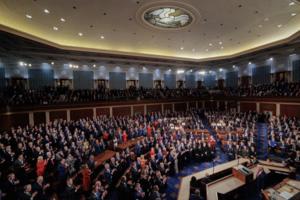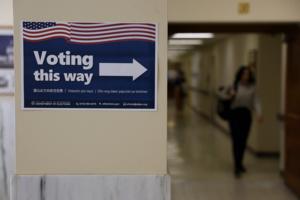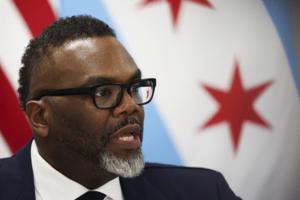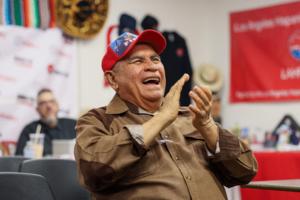Politics
/ArcaMax

Mark Gongloff: El Niño is returning with another stark warning
A science-fiction trope is the time traveler who visits the present day with a dire warning about the future only to be tragically ignored. It resonates because it’s so believable. In fact, Earth had just such a visitor recently, and we dismissed it completely.
Three years ago, scientists warned that an approaching El Niño in the Pacific ...Read more

Commentary: Trump's retirement proposal already failed -- under Obama
In his State of the Union address, the president announced a new type of government retirement account designed for Americans who don’t have access to one. Whether he can make good on this promise remains to be seen, given the likely need for legislative approval from a deeply divided Congress in an election year.
Donald Trump in 2026? Try ...Read more

Lisa Jarvis: What adults get wrong about girls and autism
For decades, autism was believed to overwhelmingly affect boys. Yet a big new study out of Sweden provides perhaps the best evidence yet that girls aren’t less likely to be autistic — they’re just less likely to be diagnosed young.
Researchers looked across 35 years of health records for nearly 2.8 million people (an incredibly complete ...Read more

Allison Schrager: America's human capital is eroding
America is having a collective freakout about jobs — specifically, that soon AI will do everything and leave everyone unemployable. This concern is not necessarily misplaced, but it is better understood as part of a larger worry: that one of the country’s most critical resources, human capital, is eroding.
A large, diverse and highly ...Read more
Editorial: BLM nominee favors federal land sales -- oh, my!
Donald Trump’s choice to head the Bureau of Land Management faced questioning this week on a variety of issues, but it’s his sensible approach to public land sales and local input that should be of utmost importance to Nevada.
Trump has nominated Steve Pearce, who served seven terms in the House as a Republican representing New Mexico, to ...Read more

Editorial: Teaching children about AI will help prepare them for the future
As part of a good education in our changing world, children should learn how to apply their own developing intelligence to the artificial intelligence that’s served up to then in ever larger quantities on the internet. Students need to understand what AI is, know its limitations and learn how to evaluate it.
Virginia has wisely worked in ...Read more

Commentary: The last shreds of our shared American culture are being politicized
At a time when so many forces seem to be dividing us as a nation, it is tragic that President Donald Trump seeks to co-opt or destroy whatever remaining threads unite us.
I refer, of course, to the U.S. men’s Olympic hockey team winning gold: the kind of victory that normally causes Americans to forget their differences and instead focus on ...Read more

Editorial: Trump's gutting of environmental standards endangers Americans' health and finances
Fifty-six years ago, President Richard Nixon sent a letter to Congress proposing the formation of a new federal regulator: the Environmental Protection Agency. Back then, big city skylines were shrouded in smog, chemicals and waste had spoiled the nation’s waterways, and Americans across the political spectrum recognized the need to safeguard ...Read more

Editorial: The sheer tackiness of Trump Airport
To critics, renaming Palm Beach International Airport after President Donald Trump smacks of political graffiti. But the coming grift is what they should be most concerned about.
The Trump Organization said Trump was “deeply honored that the people of Florida are considering renaming his hometown airport in his honor.”
But the people of ...Read more

Ronald Brownstein: The redistricting war spells doom for Congress' last moderates
The mid-decade congressional redistricting war that President Donald Trump triggered is likely to end without any clear partisan benefit for either party. But the cost to the country will be substantial.
Neither party is likely to net a meaningful advantage in the House of Representatives because the competing redistricting frenzies in ...Read more

David M. Drucker: Why young men are abandoning Trump
President Donald Trump’s second administration has displayed a certain kind of masculine flex — the sort that reflects the populist right’s notion of manliness: a defense secretary who tells the world “F-A-F-O;” a health and human services secretary who publicizes shirtless workouts; an upcoming MMA tournament on the White House lawn. ...Read more

Michael Hiltzik: AI isn't ready to be your doctor yet -- but will it ever be?
As almost everybody knows, the AI gold rush is upon us. And in few fields is it happening as fast and furiously as in healthcare.
That points to an important corollary: Beware.
Artificial intelligence technology has helped radiologists identify anomalies in images that human users have missed. It has some evident benefits in relieving doctors ...Read more

Allison Schrager: Mamdani's New York is flirting with fiscal nihilism
France is great. I visit a few times a year, and the food is fantastic, the museums are amazing, and the day care is free (or heavily subsidized) starting at 3 months old. New York City, where I live, is also great, with pretty good food and architecture. The day care, not so much.
Of course that French day care comes at a steep price. The ...Read more

Andreas Kluth: Race is the elephant in the room of US foreign policy
Muted yet deafening are the many dog whistles suggesting that American foreign policy under President Donald Trump is at least in part based on race, and specifically on white Christian nationalism.
Nobody in the administration has said so baldly. In fact, all involved reject the idea with well-rehearsed indignation. “I am, by the way, the ...Read more
Editorial: Regulations and the high cost of child care
A national report on child care regulations gave Nevada passing marks. But the review also reveals that the state could be doing more to bring down costs and expand the pool of providers.
High child care costs are a financial strain on families and can prevent parents from entering the workforce, further stretching budgets. But the problem is ...Read more

Commentary: Who are the trespassers?
Explaining cruelty to a child is difficult, especially when it comes from policy, not chance. My youngest son, just old enough to notice, asks why a boy with a backpack is crying on TV. He wonders why the police grip his father’s hand so tightly, and why the woman behind them is crying so hard she can barely walk.
Unfortunately, I tell him ...Read more

Commentary: Warrantless home searches sparked the American Revolution – now ICE wants to bring them back
In 1761, James Otis Jr., a 36-year-old lawyer, ignited an early spark of the American Revolution when he resigned his post as Massachusetts Advocate General to represent merchants challenging the British use of overly broad warrants. Though he lost the case, his speech electrified the colonies: John Adams later wrote that Otis’s argument was ...Read more

Editorial: Conservatives aren't the only ones saying Democrats have a public-sector union problem
For years now, conservative voices have railed against the outsize influence of public-sector unions on the running of American cities, with Chicago serving as one of the leading examples. Now, more left-of-center voices are sounding the alarm and saying the stakes for Democrats in charge of America’s largest cities couldn’t be higher.
The ...Read more

Gustavo Arellano: This Latino Republican Trump speech watch party was neither large, nor especially Latino
LOS ANGELES — It was the Los Angeles Hispanic Republican Club's potluck party for President Trump's State of the Union address, but there was a problem:
Not many Hispanics showed up. Or people, period.
About half of the the 20-some folks who trudged into the club's Woodland Hills offices were Latino. Four of them were Chairman David ...Read more
Editorial: State of the union: The peril and opportunity of this moment
Perhaps the only surprise at the Tuesday evening spectacle in the U.S. House of Representatives chamber was that our president did not lambaste the Supreme Court justices personally, as widely expected.
Since the court ruled 6-3 that the administration’s tariffs were unconstitutional, he has cast aspersions on the patriotism, integrity and ...Read more




















































